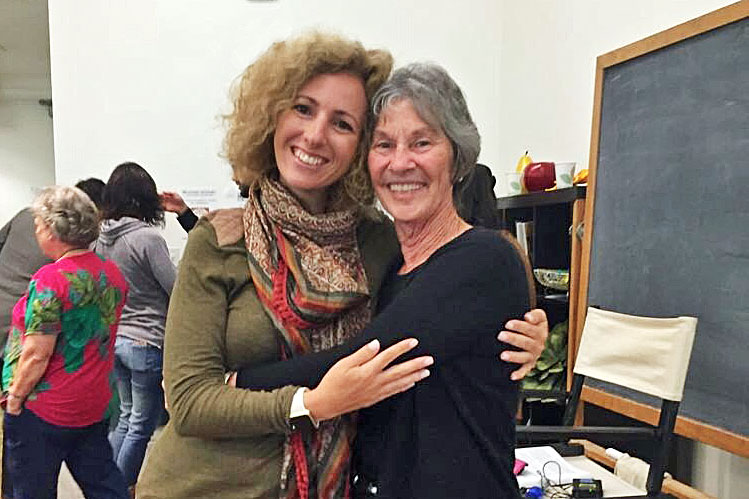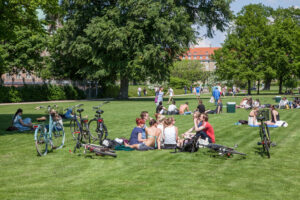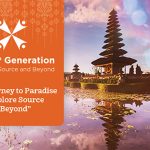To feel and to think, the educational tips of NLP’s mother

With a contagious energy and good humor, this is Judith DeLozier. But she’s much more than that. Judith breathes a unique humility and assumes it is time to hand over the baton to the new Neuro-linguistic Programming generation that “has as much or more to give than me”, she guarantees.
We met, in person, at the University of California Santa Cruz (UCSC), at the NLP University, where Judith was my trainer.
She’s punctual to all engagements and introduces herself to everyone, with two kisses.
The mother and grandmother that once was a ballerina, doesn’t practice traditional meditation. Judith, prefers to take daily walks with her dogs and says “one step I ‘m here, two steps I’m away and I come back next with another step to the now”.
Judith is not a vegetarian, she eats of everything, with moderation and drinks a lot of liquids during the day, especially water. About the metaphor that defines her, she has no doubts assuming: “it’s a spiral”
How do you feel when people say you are NLP’s mother?
Old… No! (laughs) It feels really good, you know. I feel I’ve been around for a long time. I wasn’t at the very beginning of NLP. I mean, there’s always a pre-history before any history.
I stepped on in that pathway in 1974. And there was myself, Leslie Cameron Bandler, and Mary Beth Mayers and other men and women, like John Grinder and Richard Bandler and, Robert Dilts wasn’t there yet, Steve Gilligan was. He was 19 years old. And then I met Robert within about one year and an half, he was also 19 years old. And so in away I kind of am a mom, grandma of NLP, I feel really blessed.
«Don’t teach children what to think, but how to think and if they learn how to think, then they will be able to learn anything.»
Is that true that you introduced ecology?
Introduced ecology? Well I don’t know that I introduced ecology. I certainly believe that positive intention when that sort of started to emerge. Emerged first at the six of every framing that John and I sort of developed at one point together. And then it became the idea of positive intention. Started to be, really, really more and more connected in NLP and in NLP processes and the future passing, but I don’t feel like I’m responsible for that. I feel like wisdom is a really important thing and some people have it more than others. I think that John and Richard where kind of, they were guys in their time, you know. It was the guruism of the 70’s and people were looking to gurus and I think it was very easy to be in that position and also the world was supporting them in being in that position my perspective was I don’t want to go there, because it’s long ways down. And I see it dissociating people from their communities And so if it’s that ecology, maybe so, but.
«Kids are very chinestesic, they don’t learn by listening but by doing. No kid would be left behind regarding the goals of the program if we had better strategies to deal with every representational system.»
Do you feel responsible, like a guru, of something, specifically NLP?
No, not necessarily. I mean I know the flags that I carried, one is about community in the field, that’s been part of my thing from the beginning. And the other thing is somatic syntax or the soma going the body as a full representational system, that it has memory, that it codes and decodes information and that people treated it more like it was a vessel that carried emotion. It’s always about the vessel that carried emotion. Emotions they move through us, yes, they’re very archetypal , they move through us they do it to wake us up, not to get stuck. But the body itself was not really being honored as a representational system, like the vision was, like the auditory digital was like the tonal. So that was definitely a flag. I think also in terms of making a social contribution and has been a very big flag that I carried, in working with a lot of non-profits and also creating a space who people working in non-profits can come and cry or heal themselves or be with people like them because they’re doing an extremely hard work for almost nothing or nothing. Quiet often. so I think it’s also been at least a flag.
«I would say the biggest thing is to leave a legacy. Spend some time thinking about what you want to leave behind when you´re gone and the quality of what you want to leave behind when you’re gone.»
How do you feel NLP in nowadays?
It’s been kind of amazing to see NLP over the years go through this 3 different descriptions to have been lucky enough to be part of all those descriptions and to see how they interface with each other to create a richer and richer sort of territory, or map or landscape of NLP, I love that. I love the fact that it has made so many applications, whether is leadership, or management, or the arts or health or education. I think that is really, really amazing and is kind of proof that we can do success factor modeling , that we can pass it on and it makes a difference because we’re humans and we have the same hard drive, hardware, different software downloaded but the same hardware. I love that and it’s amazing to look back and go wow, this little cowgirl from Oklahoma who grew up in a town of about 14000 people. Who would have guessed that I would find myself here having this conversation with you? That is kind of magical. So anything is possible. Don’t forget anything is possible.
How do you see NLP in education?
I think that NLP should be more in education. I see some place around where it is actually thought and used specifically in education. There are universities around the world that teaches it as a course. Mexico city is one of those and Shanghai also. It’s amazing to see how it’s becoming an entire system of therapy, for example in Austria It takes 4 years to become a therapist. And also in England, in a company called Believe where they fought really hard and did all the hard work in order to get it define as a therapeutic pathway for people, with supervision, that’s pretty amazing when you look at it. That’s a lot of good signals. I would like to see it more and more in education. It’s a little beat like don’t teach kids what to think, but how to think, and if they learn how to think they can learn anything. (Laughs)
And I think it also gives to people, little kids. Kids who are very chinestesic, all of a sudden are falling behind because they’re not on the path, they don’t see it yet, they hear it in a different way because they’re very chinestesic, and they learn by doing. No kid has to be left behind if you have, ultimately, better strategies for dealing with different systems. And I see that’s very beneficial.
I have a friend in Hong Kong who is a counselor in a very, very big school in Hong Kong. His an Australian guy. And they are designing an entire coaching package for all the teachers. But they’re going to teach it also to the 6th graders. So every year they’re going to teach this coaching process to the 6th graders so they can pass that through into the lower classes. I mean there some amazing things that can be done that will make a huge difference.
Would you like to send a message for mothers?
For moms. I mean I love your mom! And I love your mom who brought you into the world and love her mom who brought her into the world and all those hearbeats that go all the way back and then also love the big mom the Pachamama who feeds us all. Who houses us all. That would be my message love your mom and all those different meanings.
Is there something else you want to tell about NLP nowadays, mothers, education? Anything that seems important?
I think there are a lot of things that are important. I would say the biggest thing is to leave a legacy. Spend some time thinking about what you want to leave behind when you´re gone and the quality of what you want to leave behind when you’re gone. Think about what you’re teaching, what you’re passing on. Think about the legacy in that way. Think about the kind of model you are. Are you the kind of model you want to be? I think those are the kind of things to reflect on, not to judge. But to just go how can I be a better mom? How can I be a better environmentalist and take care of that mom? It’s not hard, you know?
What is your metaphor?
My metaphor is a tornado, but let me say in a different way, it’s a spiral. And sometimes it forms like a tornado and sometimes it’s also the structure of our DNA. So it occurs in nature, it occurs in us physically. You can see it in all over us. In things like fern, like the way they grow. So a spiral is a natural form in nature, but it can have a lot of power. If it’s in water or if it’s like a tornado or it can be a little dust devil that flies around. It’s natural.


